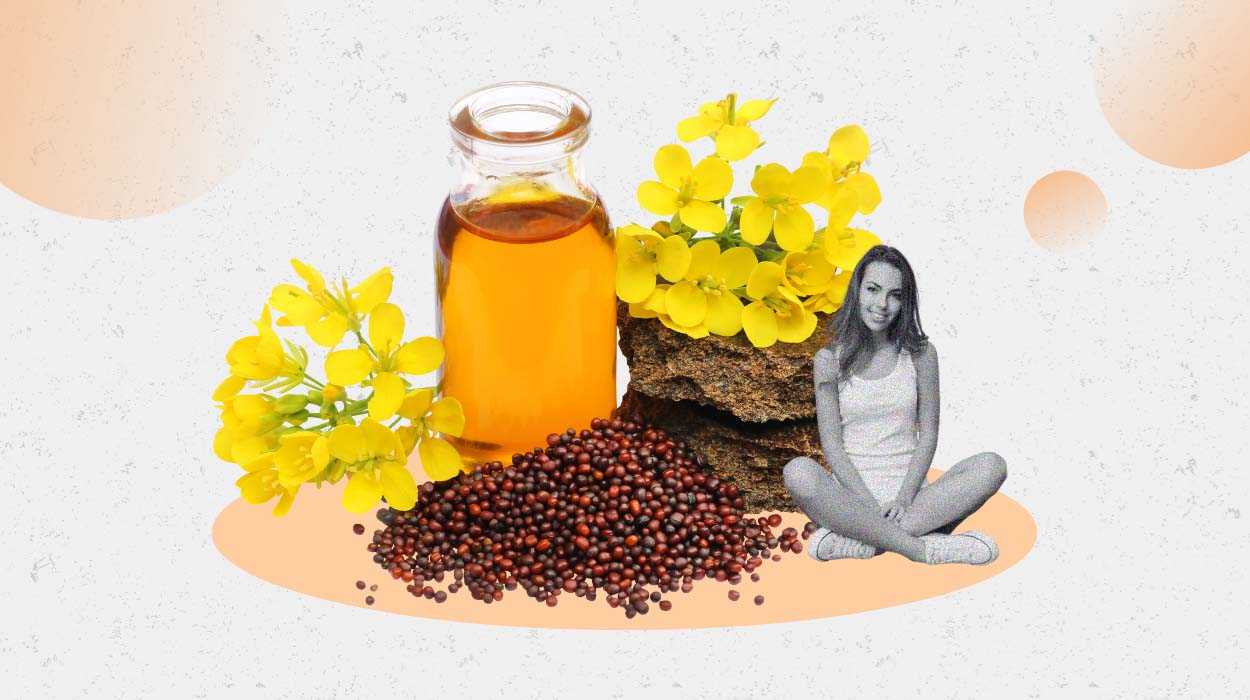 Expert's opinion
Expert's opinion
Expert's opinion
The article is a subjective view on this topic written by writers specializing in medical writing.
It may reflect on a personal journey surrounding struggles with an illness or medical condition, involve product comparisons, diet considerations, or other health-related opinions.
Although the view is entirely that of the writer, it is based on academic experiences and scientific research they have conducted; it is fact-checked by a team of degreed medical experts, and validated by sources attached to the article.
The numbers in parenthesis (1,2,3) will take you to clickable links to related scientific papers.
Mustard Oil For Hair: Benefits, How To Use & More In 2024

Ever heard of mustard oil for hair? Probably not, but learning how to use it might give you the locks you’ve always dreamed of.
Is mustard oil good for hair? Mustard oil, which comes from the seed of the mustard plant, has a high concentration of alpha fatty acids and other essential nutrients. That’s what makes it an effective hair or scalp treatment for hair thinning, hair loss, dry scalp, and other scalp issues.
According to research,[1] natural oils help nourish and fortify the follicles at the base of your hair. Plus, that oil has antibacterial and antifungal properties that can aid in treating dandruff, leaving hair nourished, smooth, and silky.
In this article, we’ll look at mustard oil benefits, usage, hair type considerations, and the potential negative consequences of using mustard oil for hair growth and health.
Key Takeaway
- Mustard oil is one of the most powerful hair growth oils.
- Mustard oil has many benefits for hair including encouraging hair growth, strengthening the hair, inhibiting the growth of yeasts and other fungi, promoting a healthy scalp, and enhancing the overall appearance of your hair.
- Some of the finest ways to use mustard oil are scalp massage, hot oil treatment, and mustard oil hair mask.
- Mustard oil applied topically to the hair is generally well tolerated. Some people, however, experience significant scalp irritation from naturally occurring substances.
What Is Mustard Oil?
Mustard oil is one of the most powerful hair growth oils. Besides adding a ton of flavor to your Indian dishes, it can also work as a natural conditioner.
According to nutritional studies,[2] mustard oil has a unique fatty acid content. This, together with the oil’s high oleic acid content, has led to its use in cosmetics. Plus, this oil’s high quantities of selenium and magnesium[3] help make it a more effective hair oil that boosts nutritional absorption into the skin. They help open sweat glands on the scalp and promote healthy hair growth.
Benefits Of Mustard Oil For Hair
Mustard oil helps your tresses because it can:
Promote Hair Growth
Regular application of this mustard for hair may help you keep your tresses healthy and smooth. This is due to minerals, such as selenium and other elements in the oil, that promote hair growth. Furthermore, regular mustard oil scalp massage stimulates blood circulation to the scalp. This gives the hair follicles the nutrients and oxygen they need to thrive.
Strengthens Hair
Mustard oil is rich in vitamin E and antioxidants and has the ideal balance of omega-3 and omega-6 fatty acids. These fatty acids nourish and fortify the hair shaft, making it more robust and less likely to break.
The strength-boosting properties[4] of erucic acid and alpha-linoleic acid in this oil prevent the hair from becoming brittle and prevent breakage as it grows longer. This oil even forms a protective layer around the hair strands, acting as a barrier against harmful environmental substances.
Inhibits The Growth Of Yeasts And Other Fungi
Mustard oil’s antibacterial[5] and antifungal properties[6] aid in the eradication of yeast overgrowth and fungal infections, both of which are common causes of hair problems. This keeps the hair moisturized and minimizes dandruff.
Promotes A Healthy Scalp
For hair to grow properly, the scalp has to be in good condition. The antibacterial and antifungal characteristics of oil for hair make it excellent for preventing infections and an overly greasy scalp, which can hurt tress health. Regular scalp massages[7] with mustard oil have been demonstrated to alleviate itching and flaking, relax irritable scalp, and boost overall tresses and scalp health.
Enhances The Overall Appearance Of Your Hair
The high fatty acid content of mustard oil not only helps to penetrate the scalp and promote healthy hair development, but it also helps to prevent split ends and add shine. Because of its powerful moisturizing powers, it makes even the most unmanageable hair easy to work with and style. Overall, the general health of your hair can be enhanced by using this oil.
Considerations For Hair Type
In general, mustard oil is an excellent ingredient for keeping a healthy scalp. Due to its inflammatory qualities,[8] this oil may be too strong for some people’s skin, scalp, and hair. Here are some things to remember while applying oil to different hair types:
- Damaged/Dry Hair: Mustard oil for hair can work wonders for dry, damaged hair. Its intense hydration may help to restore luster and smoothness to dry, brittle hair.
- Dyed Hair: The natural yellow tones in mustard oil may have a subtle darkening effect on light-colored or highlighted hair. If you have recently colored your hair, do a patch test before putting mustard oil on it.
- Greasy Hair: Avoid mustard oil if your hair is prone to oiliness. To avoid oily hair, apply the oil to the ends of your hair rather than the scalp.
Ways To Use Mustard Oil For Hair
Here are some of the finest ways to use mustard liquid oil on your scalp.
Scalp Massage
Regular massages with oil regularly can enhance blood flow to the scalp and nourish hair follicles. Massage heated mustard oil into your scalp with your fingertips in circular strokes. Allow at least one hour for it to rest. Then, return to your usual hair care routine. Don’t forget to run a patch test before putting it on your entire scalp!
Hot Oil Treatment
If you’re losing a lot of hair, try rubbing your scalp with hot mustard liquid once a week. Massage heated mustard oil into your tresses from the roots to the ends. Wrap your hair in a warm towel or a shower cap for 30 minutes to receive the full effects of the oil. When you’re through, use a mild shampoo to clean your tresses.
Mustard Oil Mask
Mustard oils are sometimes combined with other nutritious foods,[9] such as baobab, yogurt, honey, lemon, banana, or aloe vera gel, to promote hair benefits. Add a few drops of mustard oil and mix mustard oil thoroughly with any other ingredients. After leaving the mask on for 30 minutes to an hour, shampoo and condition as usual. This will provide intense nourishment and conditioning for your hair.
Here are several combinations you can try:
- Mustard Oil And Aloe Vera Hair Pack: Because of aloe vera’s outstanding nourishing and calming properties, combining it with mustard oil will do wonders for your hair. In a small container, combine mustard oil and aloe vera. Apply this mixture to your hair and scalp. After an hour, wash it with your regular shampoo and natural conditioner. This will put a halt to further hair loss.
- Mustard Oil And Lemon Juice Pack: Lemon juice’s natural antibacterial and antifungal properties[10] make it great for preventing scalp infections. Apply a mixture of lemon juice and mustard oil to your hair. Wait one hour before washing for smooth, bouncy, and healthy hair.
- Mustard Oil Banana Hair Mask: A mixture of ripe bananas and mustard oil can be used to heal badly damaged hair. Mash a ripe banana in a bowl with approximately 2 tablespoons of mustard oil. To change the texture of the mixture, you can add yogurt. Apply the smooth paste to your damp hair and cover it with a towel. Allow to set for a few minutes but not to dry, then rinse thoroughly.
Mustard Oil Side Effects
Mustard oil applied topically to the scalp is generally well tolerated. Some people, however, experience significant scalp irritation from naturally occurring substances, including allyl thiocyanate, erucic acid, capsaicin, and high selenium levels.[11] People with extremely sensitive and greasy scalps should only use mustard oil only once or twice a month. Diluting mustard oil with a gentler oil base, such as coconut oil, and using it sparingly is another option.
Conclusion
Mustard oil has many well-documented uses in both the cosmetic and medical industries. When applied topically, mustard is an excellent choice for preventing gray tresses, decreasing hair loss, and stimulating new growth.
Most people can use it on their skin and hair without worrying about negative reactions. However, mustard oil can irritate a sensitive scalp so make sure you do a patch test first.
+ 11 sources
Health Canal avoids using tertiary references. We have strict sourcing guidelines and rely on peer-reviewed studies, academic researches from medical associations and institutions. To ensure the accuracy of articles in Health Canal, you can read more about the editorial process here
- Mysore, V. and Arpita Arghya (2022). Hair oils: Indigenous knowledge revisited. International Journal of Trichology, [online] 14(3), pp.84–84. doi:https://doi.org/10.4103/ijt.ijt_189_20.
- Chugh, B. and Dhawan, K. (2011). Storage studies on mustard oil blends. Journal of Food Science and Technology, [online] 51(4), pp.762–767. doi:https://doi.org/10.1007/s13197-011-0540-8.
- Nutritionvalue.org. (2023). Oil, mustard nutrition facts and analysis. [online] Available at: https://www.nutritionvalue.org/Oil%2C_mustard_nutritional_value.html
- Mysore, V. and Arpita Arghya (2022). Hair oils: Indigenous knowledge revisited. International Journal of Trichology, [online] 14(3), pp.84–84. doi:https://doi.org/10.4103/ijt.ijt_189_20.
- Rajesh Singh Tomar and Vikas Shrivastava. “Efficacy Evaluation of Ethanolic Extract of Brassica Nigra as Potential Antimicrobial Agent against Selected Microorganisms.” Https://Www.researchgate.net/, Amity Institute of Biotechnology, Amity University, Gwalior-474005, May 2014, www.researchgate.net/profile/Rajesh-Singh-Tomar/publication/292315357_Efficacy_evaluation_of_ethanolic_extract_of_Brassica_nigra_as_potential_antimicrobial_agent_against_selected_microorganisms/links/56ace6e708ae28588c5fb6c1/Efficacy-evaluation-of-ethanolic-extract-of-Brassica-nigra-as-potential-antimicrobial-agent-against-selected-microorganisms.pdf.
- Mysore, V. and Arpita Arghya (2022). Hair oils: Indigenous knowledge revisited. International Journal of Trichology, [online] 14(3), pp.84–84. doi:https://doi.org/10.4103/ijt.ijt_189_20.
- Koyama, T., Kobayashi, K., Hama, T., Murakami, K. and Ogawa, R. (2016). Standardized Scalp Massage Results in Increased Hair Thickness by Inducing Stretching Forces to Dermal Papilla Cells in the Subcutaneous Tissue. Eplasty, [online] 16, p.e8. Available at: https://www.ncbi.nlm.nih.gov/pmc/articles/PMC4740347/
- Inoue, H., Takuji Asaka, Nagata, N. and Kinoshita, Y. (1997). Mechanism of mustard oil-induced skin inflammation in mice. European Journal of Pharmacology, [online] 333(2-3), pp.231–240. doi:https://doi.org/10.1016/s0014-2999(97)01040-6.
- Trüeb, R.M. (2021). ‘Let food be thy medicine’: Value of nutritional treatment for hair loss. International Journal of Trichology, [online] 13(6), pp.1–1. doi:https://doi.org/10.4103/ijt.ijt_124_20.
- Wilfred Mbeng Otang and Anthony Jide Afolayan (2016). Antimicrobial and antioxidant efficacy of Citrus limon L. peel extracts used for skin diseases by Xhosa tribe of Amathole District, Eastern Cape, South Africa. South African Journal of Botany, [online] 102, pp.46–49. doi:https://doi.org/10.1016/j.sajb.2015.08.005.
- Almohanna, H.M., Ahmed, A., Tsatalis, J.P. and Tosti, A. (2018). The Role of Vitamins and Minerals in Hair Loss: A Review. Dermatology and Therapy, [online] 9(1), pp.51–70. doi:https://doi.org/10.1007/s13555-018-0278-6.



